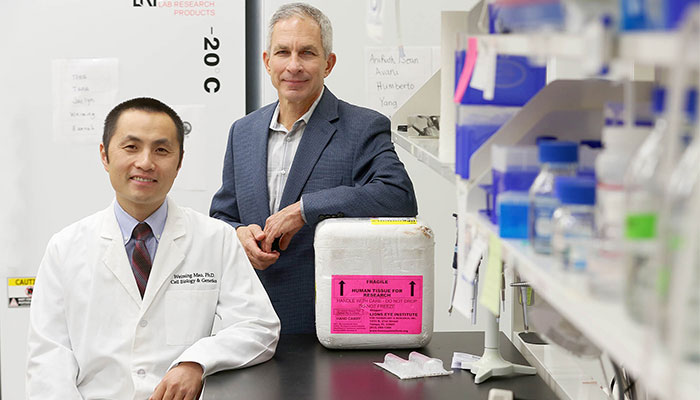A gift to improve glaucoma care
By Jan Jarvis
Mike Kettles was in the Navy and about to deploy overseas when he learned during a physical that he had glaucoma.
“I was young and I was shocked,” he said. “With glaucoma you don’t feel like anything is wrong – but it is.”
He was prescribed eye drops, which helped dramatically. But over nearly three decades the glaucoma progressed.
Today as President of the Cure Glaucoma Foundation, Kettles is dedicated to improving the outlook for others with glaucoma, the second leading cause of blindness if untreated.
To help advance research on glaucoma, Cure Glaucoma is working with the North Texas Eye Research Institute (NTERI). The foundation, which was established in 2014 by ophthalmologists at Glaucoma Associates of Texas, recently donated $10,000 to Weiming Mao, PhD, Assistant Professor at NTERI.
“We’re always looking for tools to help patients and improve glaucoma care,” Mr. Kettles said.
The research being conducted by Dr. Mao fits the bill. It focuses on the molecular mechanisms responsible for elevated intraocular pressure in glaucoma patients. That pressure is what ultimately damages the retina and optic nerve, leading to vision loss.
“Although treatment for glaucoma works over time it loses its efficacy,” Dr. Mao said. “If we can understand the mechanism for this disease it could lead to better treatments or a cure.”
Doing such research is difficult because the supply of donor eyes is limited. But the gift makes it possible for Dr. Mao to use surgical samples from the eyes of glaucoma patients.
“This funding has given me the unique opportunity to get fresh tissue from patients who agreed to donate tissue removed during surgery,” Dr. Mao said. “As a result we will get very reliable data.”
NTERI currently has 11 faculty members, 10 graduate students, and 2 postdoctoral fellows studying glaucoma, a complex disease which affects more than 3 million Americans, said Abe Clark, PhD, Executive Director and Regents Professor in NTERI.
The Cure Glaucoma Foundation works closely with Glaucoma Associates of Texas (GAT). All six of the GAT glaucoma clinicians are adjunct faculty members of NTERI.
Mr. Kettles said he is impressed with NTERI and Dr. Mao’s research.
“I think it really has a good chance, not just for glaucoma, but other diseases, too,” he said. “If that technology is harnessed, I think there will be a lot of good things to come in the future.”







Social media